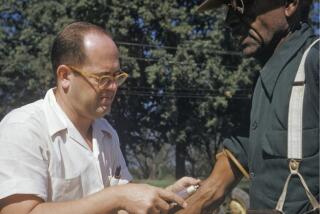Improving the lives and life span of black men
- Share via
When you think about risk factors that imperil men’s health, the usual suspects come to mind, such as smoking, a high-fat diet and not exercising. But here’s one you may not have considered: being born African American. A complex mix of biology, politics and social influences conspires to diminish well-being among black males in this country. Fortunately, this problem has caught the attention of several groups that are working to help black men help themselves live longer, healthier lives.
The media often focus on the high rate of death by homicide among black men. But a 2001 analysis by the National Center for Health Statistics determined that heart disease and cancer do far more to shorten life expectancy in black men. (African American males die before they turn 69, on average, whereas white men live to about 75.)
“African American males -- in almost every [disease] category you can think of -- have higher morbidity and mortality than do whites,” says Dr. Randall W. Maxey, president of the National Medical Assn., a professional organization for black physicians.
Maxey rattles off a list: Black men are more likely than whites to develop high blood pressure and diabetes, die of heart disease or stroke, become obese and have aggressive prostate cancer. Maxey, a nephrologist in Inglewood, also says blacks are about three times more likely than whites to develop end-stage renal disease, which requires a kidney transplant or long-term dialysis.
Some evidence suggests that biological differences contribute to this disparity. For example, Maxey notes that plasma flows more slowly through the kidneys of African Americans, which may help explain why they’re more at risk for hypertension and diabetes. And Cornell University scientists reported in 2000 that African Americans who have high blood pressure tend to have very high levels of a protein called transforming growth factor-beta 1, which appears to play a role in the disease. Researchers trying to figure out why blacks are more than twice as likely to die of prostate cancer than any other racial group have noted that African American males have lower levels of a form of vitamin D that may prevent tumors from spreading.
However, most observers agree that the greatest threats to health among blacks are racism and poverty. A 2002 Institute of Medicine report points out that blacks are less likely to receive appropriate cardiac medications or to be referred for coronary artery bypass surgery. If they have kidney problems, they’re less likely to receive dialysis or a transplant. According to the report, blacks receive lesser medical care regardless of income and whether they have health insurance.
Concerns about getting inferior treatment -- or worse -- breed mistrust of the healthcare system, says Jean Bonhomme, senior faculty advisor at Emory University’s Rollins School of Public Health in Atlanta. “A lot of African American men fear being guinea pigs,” says Bonhomme, founder of the National Black Men’s Health Network.
He says some point to the Tuskegee Study -- launched in 1932, in which scientists studied black males who had syphilis, but failed to properly treat them -- as reason to doubt the system. As a result, many avoid doctors until they’re too sick to be helped. That creates the appearance, Bonhomme says, “that when black people go into the hospital, they don’t come out again. It becomes a self-fulfilling prophesy.”
However, even black men who want to see doctors have less opportunity if they’re poor, says Wilhelmina Leigh, a senior research associate at the Joint Center for Political and Economic Studies, a Washington, D.C., organization that studies African American issues. She says that although Medicaid is available for women who lack health insurance and for their children, uninsured men in the U.S. generally don’t qualify for federal assistance until they already are very sick or 65 or older.
“The government simply doesn’t assume men have problems getting access to healthcare,” Leigh says. Yet surveys show that minority males in the United States are the group least likely to have health insurance.
Programs to improve the health of minorities aren’t new, but in recent years organizations have begun targeting African American men in particular. The National Cancer Institute, the American Cancer Society and the Centers for Disease Control and Prevention have created awareness programs aimed at black men, for example.
This summer, Maxey’s group will launch HERO (Health Education Risk-reduction Opportunity), a program that will conduct health screenings and education sessions for black males in major cities, starting in San Diego.
Because some groups remain tough to reach, however, grass-roots organizations have adopted novel tactics. A Seattle health advocacy agency, Brother to Brother, trained barbers in mostly black areas to educate clients about HIV protection; they hand out free condoms too. Why haircutters? “You go to the barber to make you look good,” says Leonard Dawson Jr., program director for Brother to Brother. “People go to barbers because they trust them.”
*
Timothy Gower can be reached by e-mail at tgower@comcast.net.






